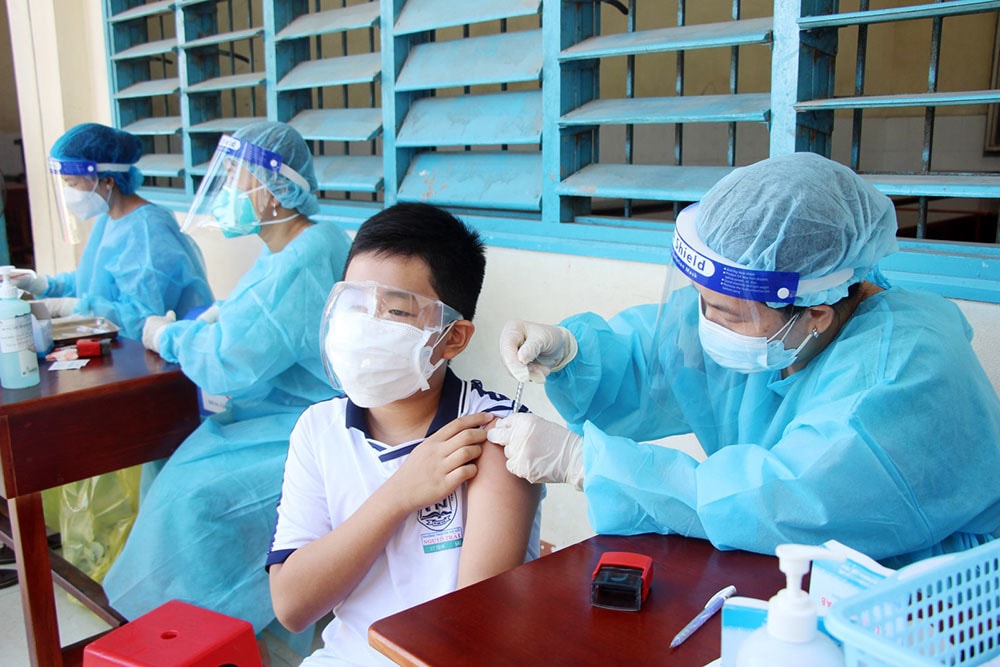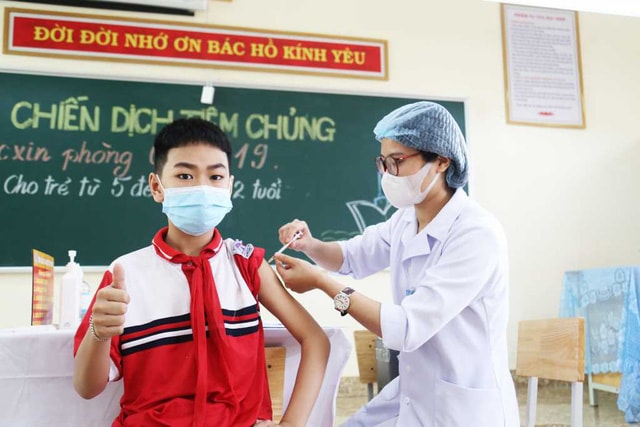Parents need to know: Things to note when giving COVID-19 vaccine to children from 5 to 12 years old
(Baonghean.vn) - Vietnam is implementing COVID-19 vaccination for children from 5 to under 12 years old. This is a rather sensitive group due to their young age, causing many parents to worry about post-vaccination reactions as well as how to monitor for unusual signs?...
1. Which children need to pay attention when getting the COVID-19 vaccine?
Dr. Nguyen Thanh Nam - Director of Pediatric Center, Bach Mai Hospital said thatCOVID-19 vaccinationis extremely necessary to prevent disease for children from 5 to under 12 years old. In particular, children who have recovered from COVID-19, children with a history of illness, allergies, chronic diseases... should also be vaccinated like adults and older children, but caution is needed.
- Children with chronic diseases should be vaccinated, but some children who are having acute illnesses or acute episodes of chronic diseases that are being treated should delay vaccination and need medical advice to be vaccinated as soon as possible.
These children should be closely monitored at the medical facility during and after the injection. Parents also need to closely monitor their children in the first days after the injection. If there are any unusual signs or signs of an old illness getting worse, they should go to the hospital for examination and evaluation immediately.
 |
| The Prime Minister directed provinces across the country to prepare all conditions for vaccinating children. Photo: File |
- Children with a history of allergies need to be consulted and evaluated by medical staff, especially pediatricians, to have specific instructions to ensure the right to vaccination for the children.
- Children who have recovered from COVID-19 should still be vaccinated, however, the timing depends on each individual child. According to the Ministry of Health's recommendations, children should be vaccinated 3 months after being infected with COVID-19. However, depending on the child's health status and risk factors, vaccination can be done earlier, and specific advice from medical staff is required in specific cases.
2. What to do before, during and after getting the COVID-19 vaccine?
According to Dr. Nguyen Thanh Nam, before administering the COVID-19 vaccine to children aged 5 to under 12, parents should monitor and detect any unusual signs in their children such as fever, respiratory symptoms (cough, rapid breathing...), headache, vomiting... to notify medical staff when examining and evaluating children before vaccination.
In particular, children with risk factors of contact with people infected with SARS-CoV-2 and/or accompanied by respiratory symptoms should continue to be monitored at home to prevent children from being infected with the SARS-CoV-2 virus that has not been detected and can infect other children when vaccinated.
During and after the injection, the child must be monitored at the injection site. Parents should coordinate with medical staff and teachers to monitor the child's condition and encourage the child to avoid anxiety and loss of composure.
Monitor the child's general condition after vaccination as follows:
Mental changes (irritability, restlessness, anxiety...),
Respiratory symptoms (rapid breathing, difficulty breathing, wheezing...),
Purple veins,
Skin rash,
sweating,
Cold hands and feet,
Vomiting, stomach ache...
 |
| COVID-19 vaccination for children at Tran Quoc Toan Secondary School (Ha Long City, Quang Ninh). This is the first locality in the country to deploy COVID-19 vaccination for this group of subjects. Photo: Quang Ninh Portal. |
3. What are common post-vaccination reactions? When should I take my child to the hospital?
As with other vaccinations, COVID-19 vaccination also has some recorded reactions such as:
Local: Painful swelling at injection site, itching.
Skin rash, swelling of some organs (lips, eyes...), purple veins.
Shortness of breath, wheezing.
Chest pain, palpitations, fainting...
Headache, lethargy
Stomach ache, vomiting, diarrhea.
Severe are signs of severe reactions such as: respiratory failure, fainting, convulsions, signs of circulatory failure (sweating, purple veins, cold hands and feet, low blood pressure...).
At the Pediatric Center, Bach Mai Hospital, doctors said they had received a number of children with reactions after vaccination with other vaccines, ranging from mild (skin manifestations) to severe (such as convulsions, circulatory failure, respiratory failure...), but all were treated promptly and no serious complications were encountered.
Even during the COVID-19 vaccination phase for children over 12 years old, doctors also encountered cases with symptoms of rash, chest pain, and heart rhythm disturbances, but all were monitored and treated stably.
4. How long after vaccination can a child resume normal activities and return to school?
According to Dr. Nguyen Thanh Nam - Director of Pediatric Center, Bach Mai Hospital: Normally, after being vaccinated and monitored at the vaccination facility, children can live and study as usual.
However, parents should also limit their children's physical activities for 3 days after vaccination and closely monitor their children for unusual signs during activities.
In general, when parents notice any unusual signs in their children after receiving the COVID-19 vaccine, they should take their children to a medical facility for immediate treatment.
